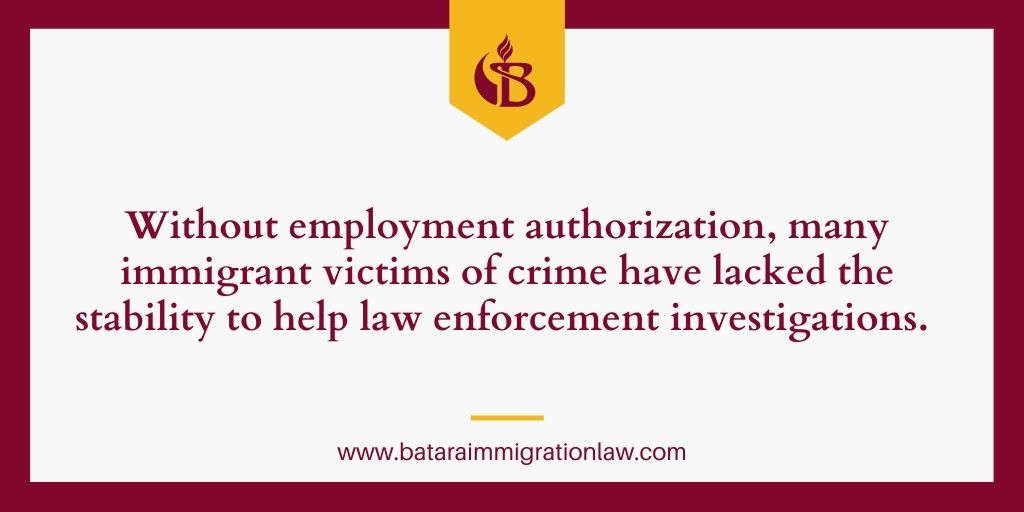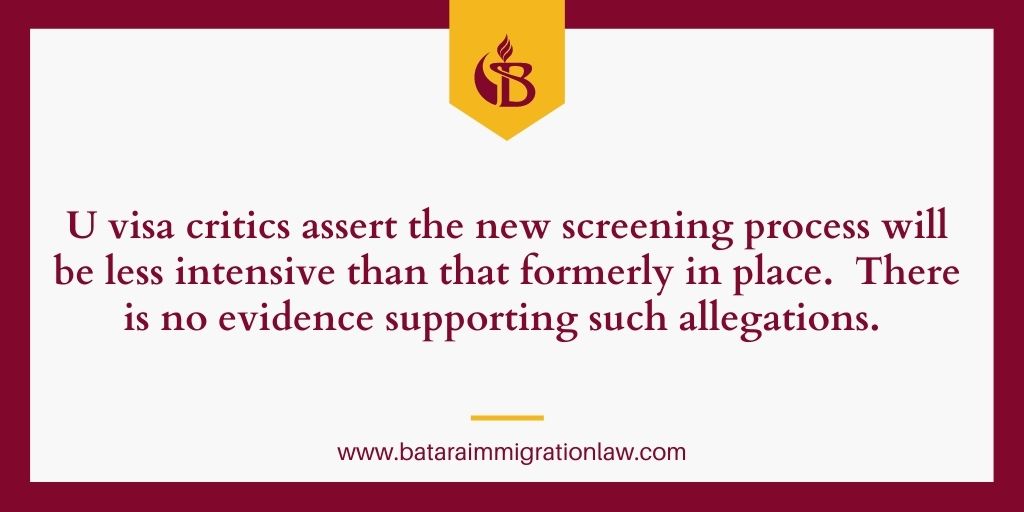
In a long overdue policy shift designed to help victims of certain types of crimes, the Biden Administration has announced a new process, known as Bona Fide Determinations (BFD) for U Visa applicants.
These procedures will enable the government to speed up the issuance of temporary work permit applications and grants of deferred action for immigrants who seek protection from perpetuators of domestic abuse.
The program was created by Congress to strengthen the law enforcement community’s ability to investigate and prosecute cases of domestic violence, sexual assault, human trafficking, and other crimes, while also offering protection to victims.
Its huge backlog coupled with lengthy processing times have hindered the program almost since its inception. As a result, immigrants whom the government had hoped would assist them in reducing violent crime remained vulnerable to further harm due to the delays.
To be blunt, without employment authorization, many victims have lacked the day-to-day stability to help law enforcement agencies in their investigations and prosecutions.

Taking Steps To Promote Public Safety
As victims of crime, U Visa applicants often experience feelings of shame and may be afraid of retaliation.
Absent the financial means to support themselves and move to a safer location, their motivation to assist the police or sheriff is offset by personal worries and fears.
The Bona Fide Determination policy changes being implemented are intended to address such concerns.
“Today we are taking steps to help victims of crime and promote public safety,” noted the press statement of Secretary of Homeland Security Alejandro N. Mayorkas. “These are individuals who have come forward to help law enforcement keep us all safe, but who are in need of a measure of protection for themselves as well.”
Why USCIS Decided To Expedite Decisions On Work Authorization And Deferred Action
Regulations cap the annual total of U Visas that can be granted at 10,000. This means starting with the 10,001 grant, the waiting list for the next fiscal year begins.
As discussed in Are U Visas No Longer Safe For Immigrant Victims Of Crime, because the number of U visas granted each year is capped at 10,000, the backlog has continued to grow each year since the program’s birth in 2009.
Some estimates show there are currently 270,000 pending U Visas that have already been approved. This means, at 10,000 visas per year, it will take 27 years for the current group of approved recipients to receive the actual grant.
Because the backlog is so huge, it has taken USCIS more than four years to handle merely the initial processing steps for new applications (at which time temporary work permits are granted along with deferred prosecution).
During this initial waiting period, there is no guaranteed protection against being deported and no right to employment authorization.
The new policies will speed up the processing of temporary work permit applications and grants of deferred action.
(U Visa applicants, married to individuals who committed domestic violence, should also take a closer look at how protections under the U Visa differ from those under VAWA>, the Violence Against Women Act.)
What is Deferred Action?
Deferred Action is the decision to defer the deportation of an immigrant as act of prosecutorial discretion. It can be granted by an immigration judge or USCIS.
While in effect, immigrants are considered to be lawfully present in the U.S. and qualify for a grant of work authorization during the Deferred Action period. But it does provide a path to permanent residence or U.S. citizenship.
What Is A Bona Fide Determination?
According to Mayorkas, the U.S. Citizenship and Immigration Services will implement a new process, known as a Bona Fide Determination, to evaluate the eligibility of U Visa applicants to receive work permits on an expedited basis.
USCIS will deem a petition bona fide if:
- The principal petitioner properly filed Form I-918, including Form I-918B U Nonimmigrant Status Certification
- The principal petitioner properly filed a personal statement from the petitioner describing the facts of the victimization
- The result of the principal petitioner’s biometrics has been received
Upon receiving an applicant’s biometrics, USCIS will conduct background checks.
If the agency BFD review determines a U Visa applicant does not pose a risk to national security or public safety, and merits a favorable exercise of discretion, it will grant them employment authorization and deferred action.
Fears Of Heightened Immigration Fraud:
Real Or Imagined?
Critics have long asserted concerns that the program is vulnerable to fraud, improperly promoted by advocates, and exploited as an avenue to obtain legal status.
They now claim the new policy will create a lower screening threshold, thereby increasing the number of fraudulent U Visa applications.
Because the streamlined Bona Fide Determination process will give all immigrants with pending U Visa cases the ability to work lawfully for years before USCIS substantively assesses their petitions, the naysayers believe the changes will heighten the number of false applications.
This argument blindly assumes the new BFD screening process will be less intensive than that formerly in place. Yet, there is no evidence supporting such an allegation.
I find it unlikely the government will not implement stringent safeguards.
Nonetheless, I agree that the incentive to file weaker applications will be enlarged.
Yet, I do not perceive such actions as the equivalent of fraudulent attempts by immigrants to circumvent the U Visa system.
To the extent such behaviors occur, they will be the product of game-playing by U Visa application preparers – such as less-than-scrupulous notarios and deceitful tik-tok lawyers.
As I discussed elsewhere, these are fake experts who dangle work permits to entice immigrants to pay for services better left untouched.
It is incumbent upon all preparers of immigration petitions and applications to thoroughly analyze the merits of a case before filing documents.
If a case is weak, or relatively frivolous, it is the duty of such persons to let their immigrant clients know.
At that point, if more evidence will strengthen the case, then they should proceed forward.
But it the case lacks supporting proof of any requirement, prospective applicants should be informed why, and their applications withheld.
In my view, as a San Bernardino immigration attorney, part of the reason that immigration reform struggles for daylight is that too many cases are filed, which should not be filed, giving immigrants a black eye in the court of public opinion.

Additional U Visa Policy Changes For Immigrant Petitioners To Know About
Here are a few significant changes to U Visa procedures announced by the Biden Administration in its press statement.
Under the new “bona fide determination” procedures, work permits and grant of deferred action will be granted in four-year increments. At the time of renewal, USCIS will update its information about each U Visa applicant and background checks.
Once applicants are granted bona fide work authorization, they will be placed on the full waiting list for U Visas. As a general rule, USCIS does not plan to conduct interim waiting list adjudications for Immigrants already who have been issued work permits and deferred action. Instead, a full evaluation and adjudication will occur when space is finally available for granting the applicant’s U Visa under the 10,000 annual statutory cap.
If applicants are not approved for bona fide work authorization under the government’s expedited initial review, their petitions will proceed to the waiting list adjudication, as previously normal. Assuming their petitions are approved at that time, they will be placed on the full waiting list, and they will receive a temporary work permit and deferred action.
USCIS also announced it is adopting the Ninth Circuit Court of appeals decision in Medina Tovar v. Zuchowski that specified how relationships based on marriage should be handled in U Visa cases. According to Medina, a marriage that exists at the time the merits of a U Visa petition is adjudicated, not when it is filed, will enable a non-U Visa immigrant spouse to also qualify for benefits as a derivative of the primary applicant.
These changes reflect an immigrant-friendly approach to U Visa policies.
Hopefully, this is the harbinger of future reviews of other immigration programs in need of repair by the current Administration.
In this spirit, I offer a simple suggestion to the Biden Administration. Why not increase the number of allotted U Visas granted per year?
After all, this would bring down the backlog to a more reasonable total – as well as speed up the entire U Visa process from start to finish.




